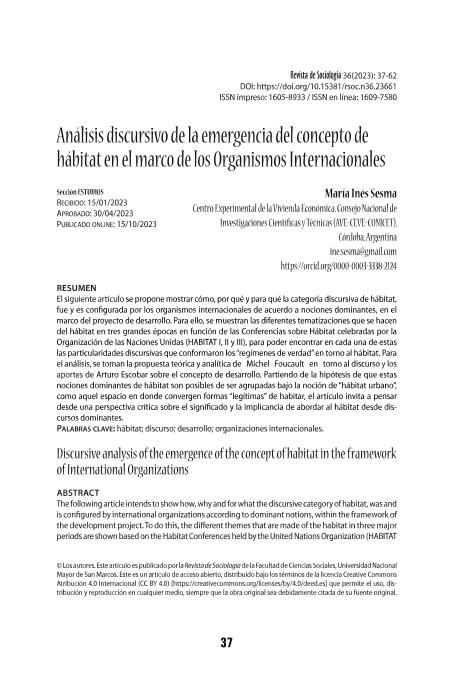Mostrar el registro sencillo del ítem
dc.contributor.author
Sesma, María Inés

dc.date.available
2024-03-11T12:22:15Z
dc.date.issued
2023-10
dc.identifier.citation
Sesma, María Inés; Análisis discursivo de la emergencia del concepto de hábitat en el marco de los Organismos Internacionales; Universidad Nacional Mayor de San Marcos. Facultad de Ciencias Sociales; Revista de Sociología; 36; 10-2023; 37-62
dc.identifier.issn
1605-8933
dc.identifier.uri
http://hdl.handle.net/11336/229981
dc.description.abstract
El siguiente artículo se propone mostrar cómo, por qué y para qué la categoría discursiva de hábitat, fue y es configurada por los organismos internacionales de acuerdo a nociones dominantes, en el marco del proyecto de desarrollo. Para ello, se muestran las diferentes tematizaciones que se hacen del hábitat en tres grandes épocas en función de las Conferencias sobre Hábitat celebradas por la Organización de las Naciones Unidas (HABITAT I, II y III), para poder encontrar en cada una de estas las particularidades discursivas que conformaron los “regímenes de verdad” en torno al hábitat. Para el análisis, se toman la propuesta teórica y analítica de Michel Foucault en torno al discurso y los aportes de Arturo Escobar sobre el concepto de desarrollo. Partiendo de la hipótesis de que estas nociones dominantes de hábitat son posibles de ser agrupadas bajo la noción de “hábitat urbano”, como aquel espacio en donde convergen formas “legítimas” de habitar, el artículo invita a pensar desde una perspectiva crítica sobre el significado y la implicancia de abordar al hábitat desde discursos dominantes.
dc.description.abstract
The following article intends to show how, why and for what the discursive category of habitat, was and is configured by international organizations according to dominant notions, within the framework of the development project. To do this, the different themes that are made of the habitat in three major periods are shown based on the Habitat Conferences held by the United Nations Organization (HABITAT I, II and III), in order to find in each of these the discursive particularities that shaped the “regimes of truth” around the habitat. For the analysis, the theoretical and analytical proposal of Michel Foucault regarding the discourse and the contributions of Arturo Escobar on the concept of development are taken. Based on the hypothesis that these dominant notions of habitat can be grouped under the notion of “urban habitat”, as that space where “legitimate” ways of inhabiting converge, the article invites us to think from a critical perspective about the meaning and the implication of addressing the habitat from dominant discourses.
dc.format
application/pdf
dc.language.iso
spa
dc.publisher
Universidad Nacional Mayor de San Marcos. Facultad de Ciencias Sociales
dc.rights
info:eu-repo/semantics/openAccess
dc.rights.uri
https://creativecommons.org/licenses/by/2.5/ar/
dc.subject
HABITAT
dc.subject
DISCURSO
dc.subject
DESARROLLO
dc.subject
ORGANIZACIONES INTERNACIONALES
dc.subject.classification
Otras Ciencias Sociales

dc.subject.classification
Otras Ciencias Sociales

dc.subject.classification
CIENCIAS SOCIALES

dc.title
Análisis discursivo de la emergencia del concepto de hábitat en el marco de los Organismos Internacionales
dc.title
Discursive analysis of the emergence of the concept of habitat in the framework of International Organizations
dc.type
info:eu-repo/semantics/article
dc.type
info:ar-repo/semantics/artículo
dc.type
info:eu-repo/semantics/publishedVersion
dc.date.updated
2024-03-08T14:25:24Z
dc.identifier.eissn
1609-7580
dc.journal.number
36
dc.journal.pagination
37-62
dc.journal.pais
Perú

dc.journal.ciudad
Lima
dc.description.fil
Fil: Sesma, María Inés. Consejo Nacional de Investigaciones Científicas y Técnicas. Centro Científico Tecnológico Conicet - Córdoba. Centro Experimental de la Vivienda Económica; Argentina
dc.journal.title
Revista de Sociología
dc.relation.alternativeid
info:eu-repo/semantics/altIdentifier/url/https://revistasinvestigacion.unmsm.edu.pe/index.php/sociologia/article/view/23661
dc.relation.alternativeid
info:eu-repo/semantics/altIdentifier/doi/http://dx.doi.org/10.15381/rsoc.n36.23661
Archivos asociados
